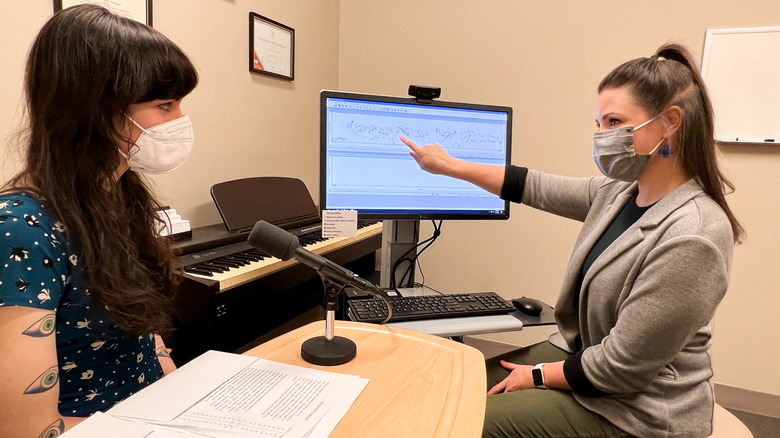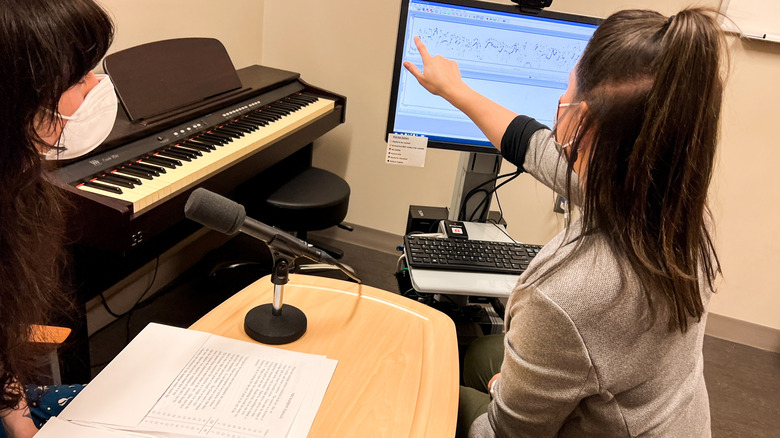Speech Therapist Anna Lichtenstein On Why Gender-Affirming Speech Therapy Matters - Exclusive
Your voice makes a big first impression on those you meet — meaning it can also either help you or hold you back. We've all seen how a mild-mannered guy with a deep, loud voice can be perceived as strong and even a natural leader, while women with naturally high voices are sometimes unjustly perceived as ditzy and weak. The voice is such a powerful marker of personal identity that some people deliberately change their pitch and style of speaking to make themselves sound more credible.
In short, it can be frustrating to have a voice that doesn't reflect who you really are. This is a real problem for trans people; for many, surgical and hormonal treatments alone aren't enough for them to present their authentic selves to the world. Trans women, especially, often find their voices betray them, according to Ohio State University speech pathologist Anna Lichtenstein. A specialist in gender-affirming speech therapy, she explained in an exclusive interview with Health Digest what gender-affirming speech therapy is and why it matters.
Having a gender-affirming voice can be a matter of personal safety
For Anna Lichtenstein, helping trans people cultivate a voice that matches their gender is a matter of social justice. "According to the US Transgender Survey (2016), transgender people face a high level of 'discrimination in numerous areas that significantly impact quality of life, financial stability, and emotional wellbeing, including employment, education, housing, and health care,'" she said. For trans people, a non-gender-conforming voice can trigger discrimination — or worse.
Lichtenstein recalled a story that a trans patient asked her to share with others. "This patient ... was a victim of a hate crime, and as she was being assaulted, she chose not to scream for help, out of fear that her aggressor would harm her even more significantly based on the masculine features of her voice. This story is upsetting and significant to why she started working with me. She wants a more feminine voice, not to use all of the time, but one that she can have access to when she wants/needs it."
If you or a loved one has experienced a hate crime, contact the VictimConnect Hotline by phone at 1-855-4-VICTIM or by chat for more information or assistance in locating services to help. If you or a loved one are in immediate danger, call 911.
Medical solutions can't always deliver a gender-affirming voice
While medical treatments such as surgery and hormone therapy can help trans people attain the appearance that feels right for them, these interventions can't always change one's voice. "The majority of my patients are transfeminine due to the hormone treatment having no impact on the vocal tract," Anna Lichtenstein said. "Because of this, all voice feminization is through training. I do have transmasculine patients on my caseload as well for various reasons, but it is not as common. Testosterone thickens up the vocal cords after around 3-6 months, causing them to vibrate at a slower frequency leading to a lower pitch."
Lichtenstein added that each of her patients comes to her with a unique set of personal goals for their ideal voice, so there's no one-size-fits-all therapeutic program that will work for everyone. Among the aspects of speech patients want to change are non-physiological features, which is where Lichtenstein's specialized knowledge of language and speech can fill in the gaps medical treatments leave open.
"We can also focus on gendered verbal characteristics (word choice, sentence structure), non-verbal language characteristics (body language, gestures, etc.) and even non-speech voiced tasks (coughing, laughing, sneezing, etc.)," she explained.
For more information, see the Wexner Medical Center at Ohio State University's site for gender-affirming care and James, S. E., Herman, J. L., Rankin, S., Keisling, M., Mottet, L., & Anafi, M. (2016). Statistics are taken from The Report of the 2015 U.S. Transgender Survey, Washington, DC: National Center for Transgender Equality.



